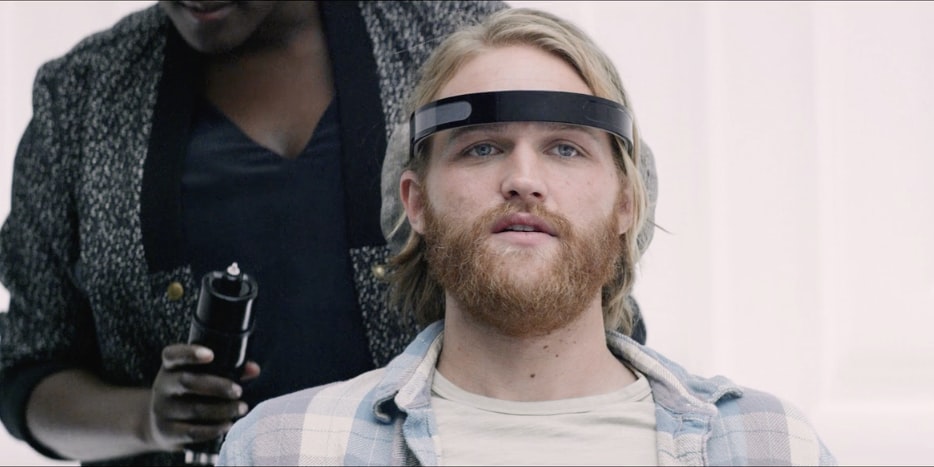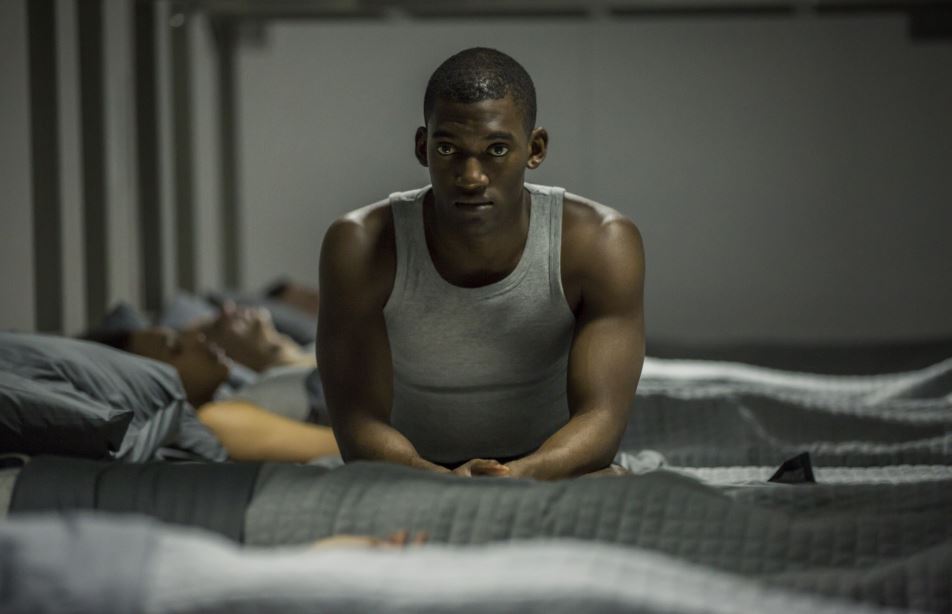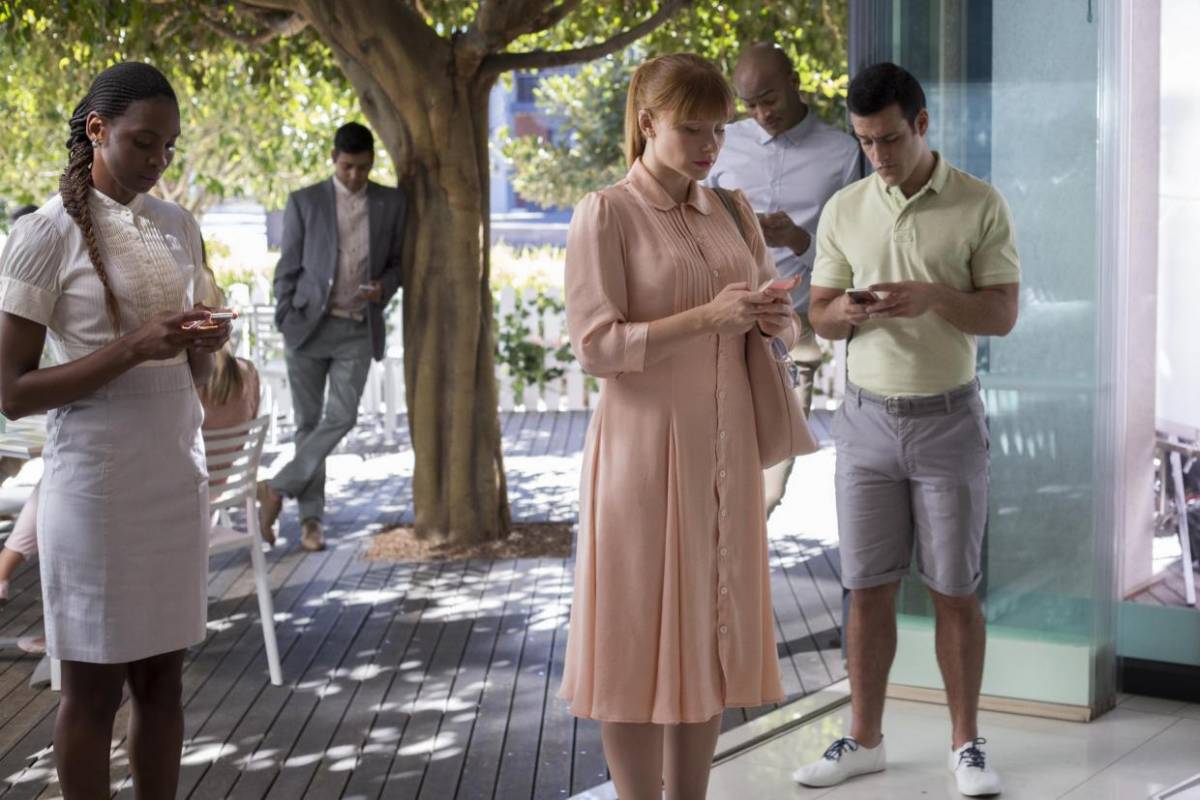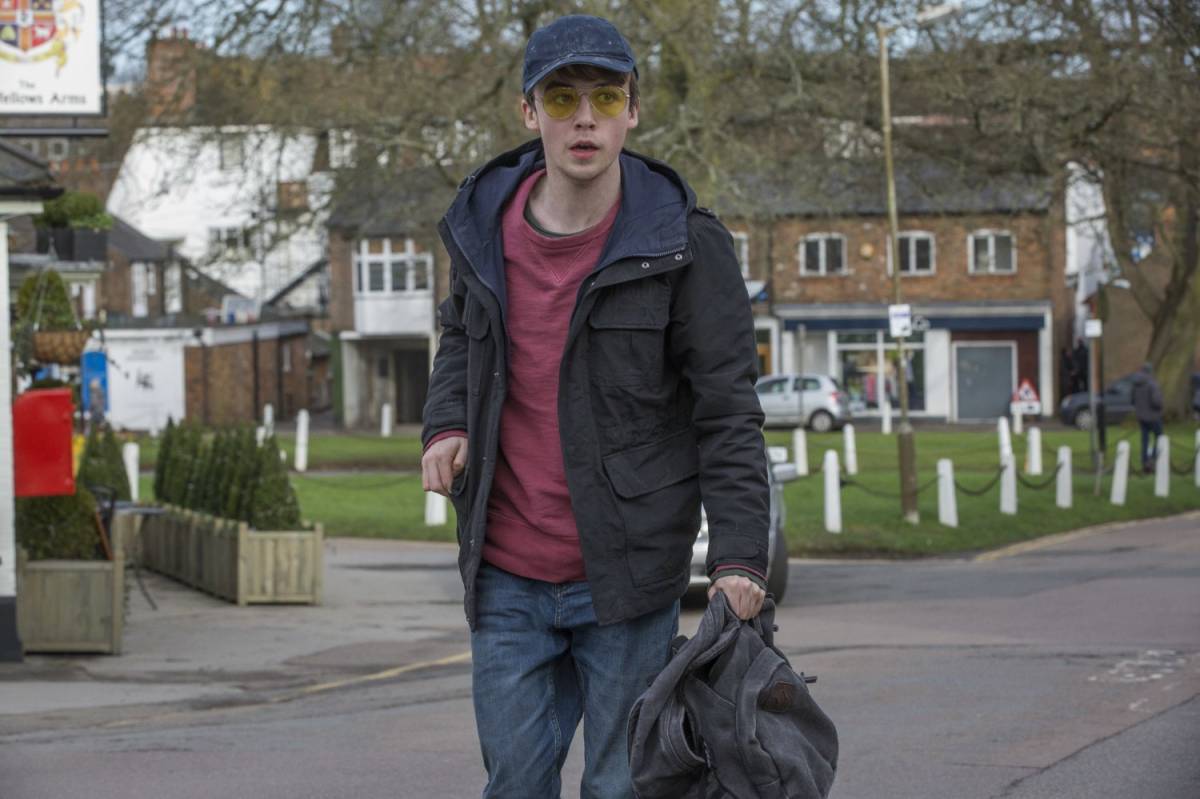It’s been a week since Netflix dropped the highly anticipated third season of Charlie Brooker’s Black Mirror, so it’s probably a fair guess that fans of the show would have devoured the six new episodes by today at the very latest. And what a mixed bag they were. Some were highly reminiscent in tone of what’s come before, while others presented new scenarios with higher budgets. Both methods worked, but some instalments proved that there could be an equal amount of failure to go along with success.
So, without further adieu, I’d like to count down the season; beginning at the worst of the new offerings, and ending with what I’d consider the very best. Of course, this list is entirely subjective, but it’s fairly inarguable that some are betters than others. Also, because it’s just easy to do so, I’ll be referencing potential spoilers throughout. On with the list.
6. Playtest

‘Playtest‘ was such a promising episode that just fell to pieces towards the end. For one, it was the first time that Black Mirror had fully delved into the horror genre – and not just because it was tense, either; the episode had full-on horror tropes. Creepy old house? Check. Ghoulish figures who haunt the halls? Check. I had high hopes around halfway through the episode’s hour-long run time, but these were quickly washed away when things just got a little too…wacky.
The episode’s protagonist, Cooper (Wyatt Russel), was an engaging guy. Relatable and layered, ‘Playtest’ kept you guessing throughout, especially when it came to the constant phone calls from his mother. But just as things are going so well, and the tension is building, it jumps fully into the surreal and it just begins to fall apart. The re-appearance of Cooper’s female friend could have made for an interesting moral dilemma, but when it turns out that she’s just a monster, the disappointment hits you harder than the knife through Cooper’s chest. If there was ever a case of squandered potential, then ‘Playtest’ would definitely be it.
5. San Junipero

The introduction to ‘San Junipero’ had me hooked immediately. It was set in a ludicrous version of the 80s, and had a perfect mix of visuals and sound to make an atmosphere that was palpable. However, I also managed to predict the big twist at the end of the episode within the first five-minutes, so there’s also that.
Of course, it isn’t the end of the world if you guess the ending before very long; it just makes it much less satisfying when you’re spot-on. Telling the story of two entwined lovers who are seemingly out of time, ‘San Junipero’ tells the story of a lost party town that seems to only come to life every Saturday night. When I said that this list was mostly subjective, this episode is certainly a key reason why. For me, ‘San Junipero’ marked the point at which I understood that these new Black Mirror episodes weren’t all meant for me; it was sentimental, romantic, and provided a happy ending which seemed as out of place as its protagonists. If you’ve never seen an episode of Black Mirror and you jumped into this one first, you’d be shocked at how different the others are once you got around to checking them out. Some will likely love it, but for me, the fourth episode of Black Mirror Season 3 was a bit of a let-down.
4. Men Against Fire

‘Men Against Fire’ was probably the first time that Black Mirror strayed from more domestic issues, and struggled with something as monumental as the holocaust. Or at least, that’s what I got from this episode: a world in which innocents are persecuted and hunted purely based upon irrelevant factors of race, appearance, and so on. Referred to as “Roaches” (read: Jews), ‘Men Against Fire’ was another instalment in which the ending could be seen from a mile away. However, this time around it really didn’t matter all that much, because it was enthralling to watch the world crumble around our protagonist Stripe (Malachi Kirby). The introduction of House of Cards’ Michael Kelly halfway through the episode was also a welcome sight, because he pulls off the quietly menacing antagonist very well.
The design for the “Roaches” in their animalistic form was also pretty thrilling to see. Almost like something akin to vampires, their ravenous jaws made it clear to see why the future soldiers of ‘Men Against Fire’ would do anything to put them down, and made you empathise for the others soldiers when they couldn’t understand Stripe’s moral dilemma. All in all, it’s a pretty great episode that tackles issues Black Mirror hasn’t tangled with before.
3. Nosedive

The opening episode to season 3, ‘Nosedive‘ truly showed off Netflix’s bigger budget when it came to Black Mirror. It’s the only episode with a dedicated title sequence, and stars Hollywood actress Bryce Dallas Howard as the lead in a world that’s obsessed with social media. Revolving around an app on which people rate each other, the episode devolves into a narcissistic game of arrogance that quickly falls in on itself.
Sure, some of the moral lessons that ‘Nosedive’ tries to teach can come across as a little preachy, but it’s forgivable when everything is delivered with such a slick sheen and polish. The picturesque, pastel neighbourhoods brilliantly parallel the more gritty side of reality that everybody has turned a blind eye to, and it works exactly as intended. Also, I initially thought that the hyper-friendly way in which people spoke to one another was absurd and annoying, but it makes complete sense when an offhand remark or insult could potentially result in social ruin. Behind every cheesy grin is another empty person trying desperately to climb the social ladder.
The episode isn’t without its flaws, but I feel like it provides the perfect nosedive (haha) into this new season of Black Mirror. What it lacks in storytelling and surprises it more than makes up for in introspection, and everything is delivered in a package you won’t be able to turn down. Give it a go, and then check out the other’s on this list if you fancy something a little darker.
2. Shut Up and Dance

This is proper Black Mirror. As much as I enjoyed the more polished, Americanised glint of some other episodes, ‘Shut Up and Dance‘ provides a world that’s essentially our own, and in a fashion that will have you cringing and uncomfortable by the end. The episode’s lead, Kenny (Alex Lawther), is a believable and scarily familiar character who keeps the tension strung high until the grisly reveal of paedophilia by the episode’s conclusion. The scary part is that we all know somebody like Kenny: mild-mannered, quiet, shy, and hiding a dirty little secret which eventually costs him everything.
The acting in ‘Shut Up and Dance’ was what really sold it for me. Kenny’s partner in crime Hector (Jerome Flynn) provided an equally twisted perspective on the episode’s obsession with voyeurism and consequences, and one which has you guessing throughout. I was initially disappointed by the handful of questions that remain unanswered by the end, but days after watching it and I still can’t stop thinking about the fragments of dialogue which bring everything crashing down. It’s bleak, depressing, and melancholy. And it’s wonderfully Black Mirror.
1. Hated in the Nation

And here we arrive at the best episode of the lot. What is practically a feature-length production, ‘Hated in the Nation’ takes Black Mirror down the police-procedural route, and explores a soon-to-be future of surveillance and social fury. People are dying on account of Twitter mentions, and this only fuels more hatred towards public figures. It would almost be funny if it didn’t hit so close to home.
I struggled with which episode to place in the top spot, because ‘Shut Up and Dance’ really was something quite spectacular. However, just because of the mix of anguish yet satisfaction you feel by this episode’s ending, I felt that it deserved to be hailed as the best. You’ve got killer robotic bees, toxic public personas not too dissimilar from ours today, and a whole heap of introspection that points the titular mirror directly at ourselves. While none of the episodes released last Friday managed to surpass the best of what has come before, ‘Hated in the Nation’ gave it a bloody good go. For that, I feel like it deserves some credit.
Some of the coverage you find on Cultured Vultures contains affiliate links, which provide us with small commissions based on purchases made from visiting our site.

